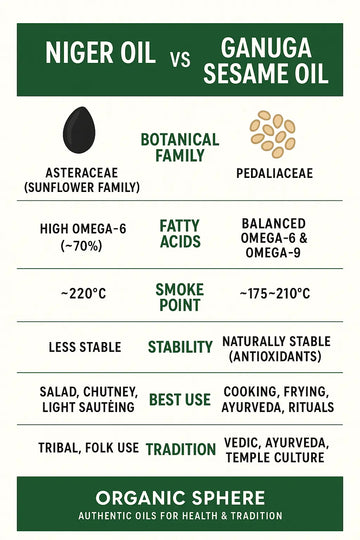Niger Seeds – Cumin Seeds – Kalonji (Black Cumin Seeds)
1. Niger Seeds - Want to buy?
-
Botanical Name: Guizotia abyssinica
-
Common Names: Ramtil, Nyger, Noog, Uchellu (Kannada), Karale (Marathi), Payellu (Telugu)
-
Description:
Small, black, oval seeds used primarily for oil extraction and culinary applications. Native to Ethiopia and India. Flavor is mild and nutty.

-
Nutritional Profile (per 100 g):
-
Energy: ~515 kcal
-
Fat: 43 g (Rich in polyunsaturated fatty acids)
-
Protein: 18 g
-
Fiber: 7 g
-
Vitamin E: 35–40 mg
-
-
Medicinal & Functional Properties:
-
Supports cardiovascular health (omega-6 fatty acids)
-
Anti-inflammatory action
-
Promotes healthy skin
-
Traditional use for improving appetite and digestion
-
2. Cumin Seeds Want to buy?
-
Botanical Name: Cuminum cyminum
-
Common Names: Jeera (Hindi), Jeerige (Kannada), Jeeragam (Tamil), Jira (Gujarati/Bengali), Kamoon (Arabic)
-
Description:
Elongated, brownish-yellow seeds with warm, earthy, and slightly peppery flavor. Native to the Mediterranean and Southwest Asia. Widely used in global cuisines.

-
Nutritional Profile (per 100 g):
-
Energy: ~375 kcal
-
Fat: 22 g
-
Protein: 18 g
-
Fiber: 11 g
-
Iron: 66 mg
-
Antioxidants: High levels of polyphenols
-
-
Medicinal & Functional Properties:
-
Improves digestion and relieves bloating
-
Antimicrobial properties for gut health
-
Supports blood sugar regulation
-
Used traditionally for respiratory health
-
3. Kalonji (Nigella Seeds)
-
Botanical Name: Nigella sativa
-
Common Names: Black cumin, Black seed, Karunjeeragam (Tamil), Krishna Jeerige (Kannada), Kalonji (Hindi/Urdu), Habbat al-baraka (Arabic)
-
Description:
Tiny, matte-black, angular seeds with a pungent, slightly bitter taste. Native to South and Southwest Asia. Known for powerful medicinal uses.

-
Nutritional Profile (per 100 g):
-
Energy: ~345 kcal
-
Fat: 15–18 g (with thymoquinone compound)
-
Protein: 16–20 g
-
Fiber: 10 g
-
Calcium: 265 mg
-
Antioxidants: High thymoquinone content
-
-
Medicinal & Functional Properties:
-
Potent anti-inflammatory and antioxidant effects
-
Supports immune function
-
May regulate blood pressure and cholesterol
-
Used traditionally for respiratory, skin, and liver health
-
Comparative Highlights
| Attribute | Niger Seeds (G. abyssinica) | Cumin Seeds (C. cyminum) | Kalonji (N. sativa) |
|---|---|---|---|
| Color | Black, oval | Brownish-yellow, elongated | Matte-black, angular |
| Flavor | Mild, nutty | Warm, earthy, peppery | Pungent, slightly bitter |
| Key Nutrients | Omega-6 fatty acids, Vitamin E | Iron, antioxidants | Thymoquinone, antioxidants |
| Primary Use | Oil, chutneys, Herbal Tea, Decoctions | Culinary spice, Herbal Tea, Decoctions | Spice, pickles, herbal |
| Medicinal Focus | Heart & skin health | Digestion & gut health | Immunity & inflammation |
| Origin Regions | Ethiopia, India | Mediterranean, SW Asia | South/SW Asia, Middle East |
✅ Note: All three seeds have distinct nutritional and medicinal properties. While Niger seeds are most valued for heart health and skin benefits, Cumin seeds excel in digestion and gut support, and Kalonji stands out for immune and anti-inflammatory uses.
Based on the provided sources, Niger seed oil is recommended for various health conditions due to its properties and nutritional content.
Here are the diseases and conditions for which Niger seed oil is recommended in Dr. Khadar's lifestyle and protocols:
|
Weight gain (Underweight) |
• Parkinson’s disease | Alzheimer’s disease |
|
• Fits/Epilepsy |
Paralysis | Kidney stones |
|
Gall bladder stones |
Pancreas stones | Nerve problems |
|
Vertigo |
Migraine | Sweat in Palms/Sweat in Foot soles |
|
Snoring |
Stammering | Hearing Problems |
|
Infertility |
Low Sperm Count | HIV |
|
Skin Problems |
Psoriasis | Eczema dry/weeping |
|
Vitiligo |
Ichthyosis | Bald Head |
|
Alopecia Areta/Alopecia Totalis |
Lupus, S.L.E. | Fatty liver |
|
Spleen issues |
Pancreatitis | Differently abled |
|
Autism |
Crebral Palsy | Polio |
|
Physically disabled |
ADHD | Lipoma |
|
Autoimmune diseases |
Motor Neuron diseases | Muscular Dystrophy |
|
Scleroderma |
Multiple Sclerosis |
Ankylosing Spondylitis
|
|
Myasthenia Gravis |
Mental illness |
Insomnia |
|
Anxiety |
Fear |
Mood swings |
Niger seed oil is highlighted for its content of Linoleic acid and Niacin, which are important for nerve and brain cell regeneration and cleaning. It also helps with cosmetic wellness and skin health. It can be used directly as Ghee and is suitable for sweets, pickles, and chutney powders. Traditionally, temples have used this oil for "Naivedya" and "Prasada".
When recommended, it is generally advised to consume 2 to 3 spoons of the oil with a 30-minute gap between oil consumption and decoctions. The source of oils should strictly be from bull-driven wooden Ghanis and stored in glass or porcelain containers. This type of oil extraction ensures that the oil is healthy, as it is extracted at normal temperature and pressure without excessive heat or chemicals.





